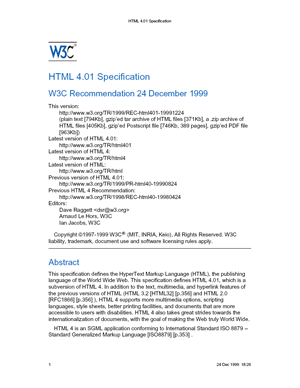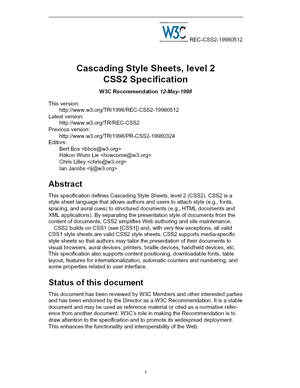 Computers: HTML: Reference
Computers: HTML: Reference Computers: HTML: Reference
Computers: HTML: Reference In principle, both HTML (the Hyper-Text Markup Language) and CSS (Cascading Style Sheets) are 'open standards', set by the W3C (World Wide Web Consortium), founded by Tim Berners-Lee, inventor of the World Wide Web itself.
In principle, both HTML (the Hyper-Text Markup Language) and CSS (Cascading Style Sheets) are 'open standards', set by the W3C (World Wide Web Consortium), founded by Tim Berners-Lee, inventor of the World Wide Web itself.
In practice, what really matters is not how the W3C say HTML and CSS should be interpreted by browsers, but how they actually are interpreted by browsers: and above all, by Microsoft's Internet Explorer, which is used by 70-80% of all users.
 From the earliest days of the Internet, Microsoft has exhibited the most supremely arrogant attitude towards it. Initially - incredible though it now seems - they even aimed to replace it all together with MSN, the Microsoft Network. Even now, the Windows version of Internet Explorer remains amongst the least standards-compliant browsers available.
From the earliest days of the Internet, Microsoft has exhibited the most supremely arrogant attitude towards it. Initially - incredible though it now seems - they even aimed to replace it all together with MSN, the Microsoft Network. Even now, the Windows version of Internet Explorer remains amongst the least standards-compliant browsers available.
The moral of this story is that though this course was based on W3C's documented recommendations for HTML 4 and CSS 2, it nevertheless had to be tested in a number of browsers to be sure that it would really work for most users. When you develop your website, do the same: download several different browsers (most of them are free), load your pages in all of them, and check that they look right, and that they work. Ask your friends to check your site too: especially if you are lucky enough to know people who use different operating systems and therefore use browsers you cannot use on your own system.
The other moral of this story is that if you use Windows, don't use Internet Explorer, use Firefox.
Until the revolution, that is the best we can do.
This course has been tested with:
 Firefox 1.0.6
Firefox 1.0.6
Website: www.mozilla.com/firefox
 Internet Explorer 6
Internet Explorer 6
Website: www.microsoft.com/windows/ie
 Netscape 8.0.3.3
Netscape 8.0.3.3
Website: browser.netscape.com
 Opera 8.5
Opera 8.5
Website: www.opera.com
This course was based on HTML 4 and CSS 2 as defined by the W3C in the following recommendations documents:
 W3C HTML 4.01 Specification
W3C HTML 4.01 Specification
Download PDF: click here
Online version: www.w3.org/TR/html4
 W3C CSS2 Specification
W3C CSS2 Specification
Download PDF: click here
Online version: www.w3.org/TR/1998/REC-CSS2-19980512/